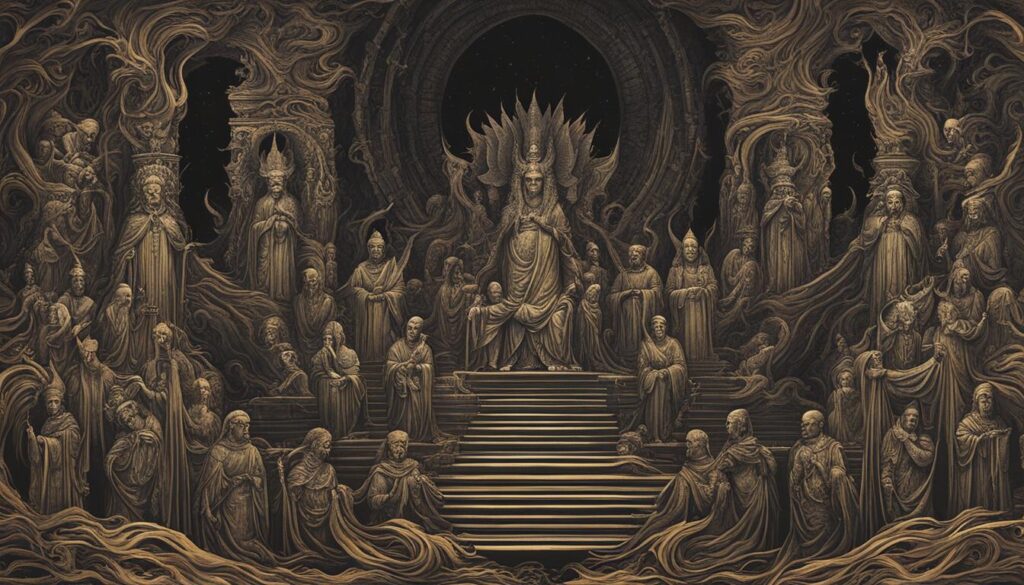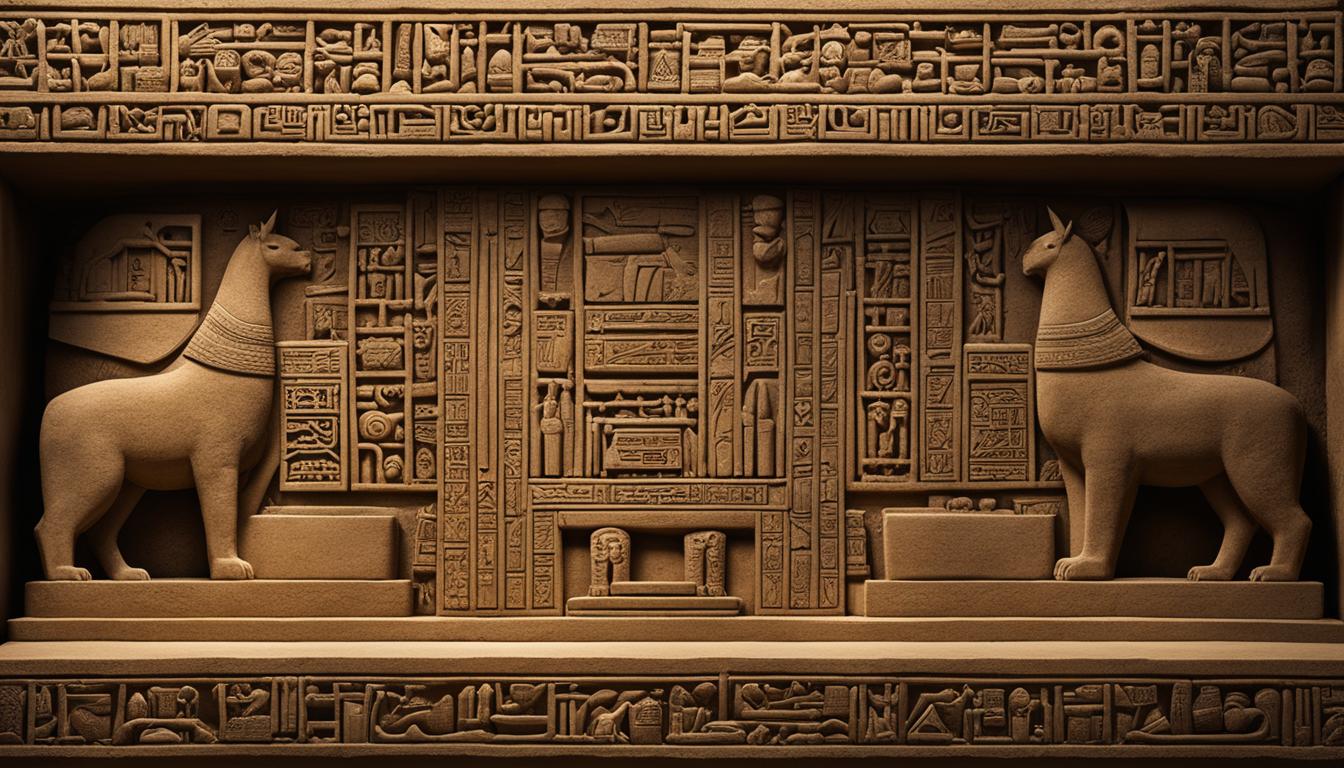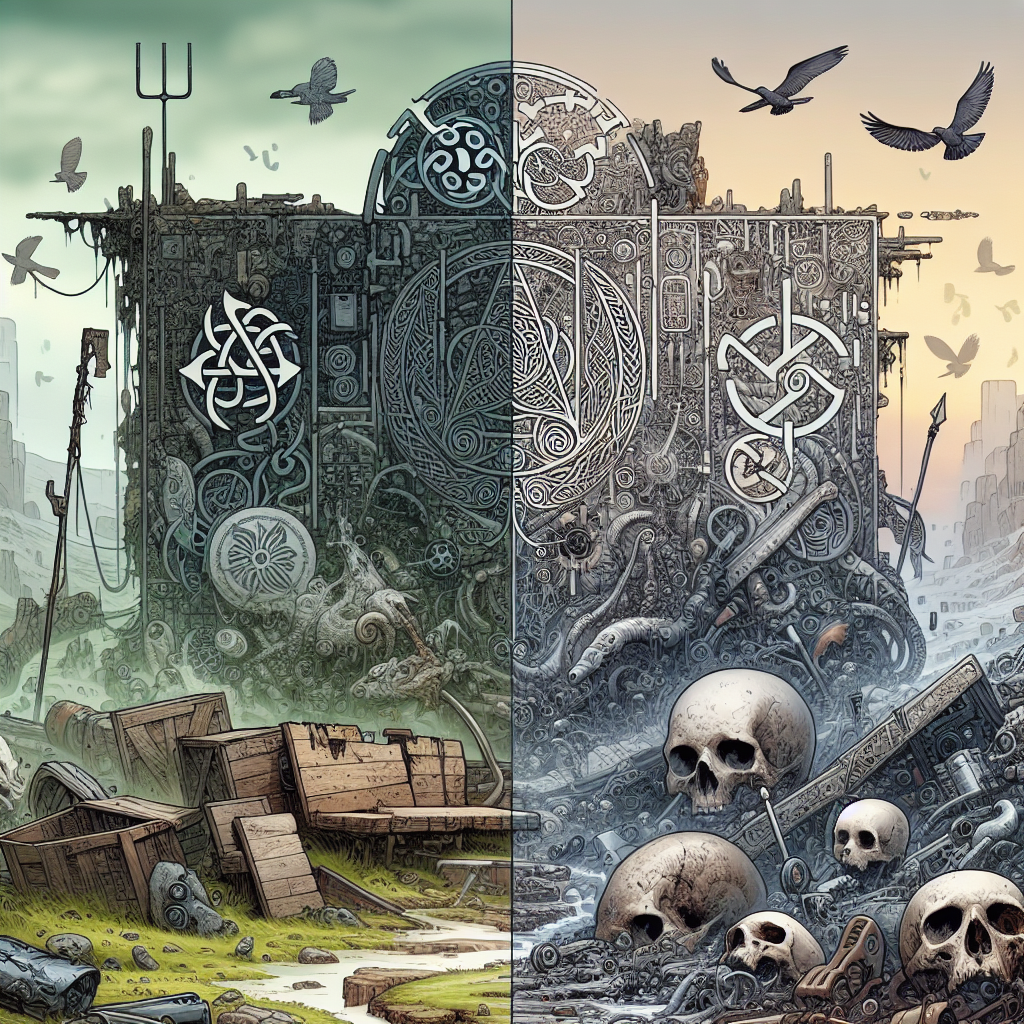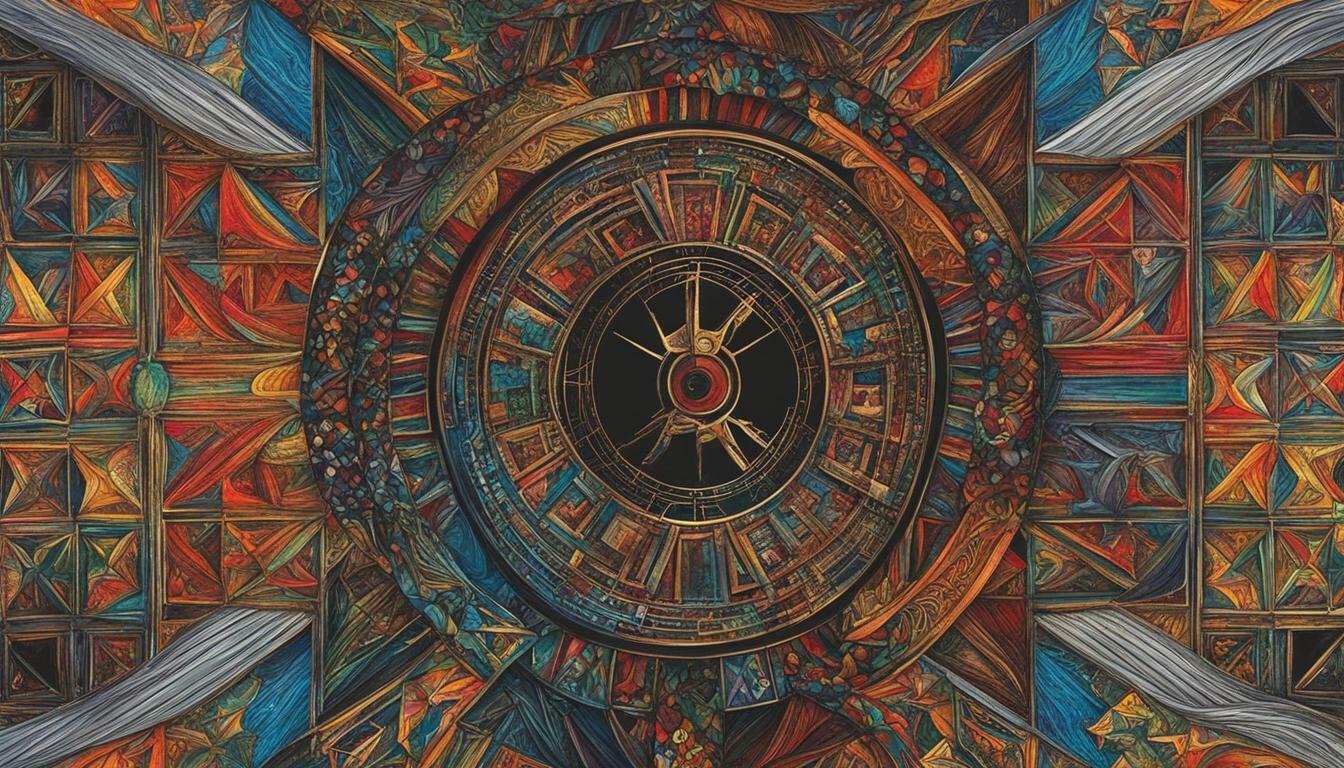When examining ancient civilizations, the concept of the afterlife often highlights their religious beliefs and cultural values. The Babylonians and Egyptians, two prominent civilizations of the ancient world, had distinct views on the afterlife. Understanding the differences in their beliefs can provide valuable insights into their religious practices and societal norms.
Key Takeaways:
- The Babylonians and Egyptians had contrasting views on the afterlife.
- The Babylonians focused on divine punishment for sins committed against gods and society.
- The Egyptians emphasized leading a just life to gain acceptance into the afterlife.
- Beliefs about sin, judgment, and eternal life varied significantly between the two civilizations.
- Understanding these differences provides insights into the cultural and religious variations of ancient Mesopotamia and Egypt.
Babylonian Views on Sin and Divine Judgment
The ancient Babylonians had a comprehensive understanding of sin and its consequences in both the earthly realm and the afterlife. Their religious texts reveal that they considered sins committed against gods as well as sins committed against society deserving of divine punishment. Sin in Babylonian religion encompassed a wide range of behaviors, including acts of betrayal, dishonesty, and disrespect towards gods and fellow humans.
The Babylonians were acutely aware of the moral framework established by their gods and held a strong consciousness of what was morally right and wrong. They recognized the need for forgiveness and frequently included fervent pleas for pardon in their prayers. These prayers served as a means of addressing their transgressions and seeking redemption in the eyes of the divine.
While the nature of divine judgment in the afterlife is not clearly described in available texts, it is known that the names of the deceased would be recorded, indicating their status as legitimate dwellers in the underworld. This suggests a form of judgment and recognition of their actions during their earthly lives.
| Sins in Babylonian Religion | Consequences of Sin |
|---|---|
| Acts of betrayal | Divine punishment and retribution |
| Dishonesty | Loss of divine favor and potential divine retribution |
| Disrespect towards gods | Divine punishment and potential exclusion from the afterlife |
| Disrespect towards fellow humans | Potential social consequences and divine judgment |
These beliefs on sin and divine judgment reflect the Babylonians’ understanding of both the spiritual and societal dimensions of their actions. Through their prayers and appeals for forgiveness, they sought to rectify their sins and ensure a favorable judgment in the afterlife.
Egyptians and the Pursuit of a Just Life
In ancient Egyptian religion, the concept of leading a just life was of paramount importance in the journey to the afterlife. Egyptians believed that their actions in the earthly realm would determine their fate in the divine realm. They valued righteousness and sought to prove their worthiness to the gods.
One of the key components of their belief system was the practice of negative confessions. These confessions, found in the Book of the Dead, were recited by the deceased during their journey to the afterlife. They listed the wrongdoings that the deceased denied committing, affirming their innocence and adherence to a moral code.
The Book of the Dead itself played a vital role in guiding the Egyptians towards leading a just life. It contained spells and affirmations that emphasized the importance of righteousness and the consequences of wrongdoing. Through the recitation of these texts, the Egyptians sought to align themselves with the divine order and ultimately gain acceptance into the afterlife.
Negative Confessions and the Pursuit of Righteousness
The negative confessions offered the deceased an opportunity to deny any involvement in sinful acts and to present themselves as individuals who had lived a just life. By declaring their innocence, they hoped to prove their worthiness to the gods and secure a favorable outcome in the afterlife.
The belief in a Day of Judgment was also central to the Egyptian understanding of the afterlife. On this day, the deceased would face scrutiny before the gods, with Osiris serving as the judge. The Egyptians viewed this day as a positive journey, as they had confidence in their pursuit of righteousness and their ability to escape death.
In summary, the Egyptians believed in the pursuit of a just life as a means to gain acceptance into the afterlife. They emphasized righteousness, as reflected in their practice of negative confessions and their reliance on the Book of the Dead. The concept of a Day of Judgment further underscored their belief in the importance of leading a morally upright life.
| Key Beliefs | Egyptian Afterlife Beliefs |
|---|---|
| Justice and Righteousness | The pursuit of a just life was crucial for gaining acceptance into the afterlife. |
| Negative Confessions | Deceased recited negative confessions to deny any involvement in sinful acts and affirm their innocence. |
| Book of the Dead | Ancient Egyptian religious text containing spells and affirmations that guided the pursuit of righteousness in the afterlife. |
| Day of Judgment | Deceased would face scrutiny before the gods, with Osiris serving as the judge. |
Differences in Afterlife Concepts
The afterlife concepts of the ancient Babylonians and Egyptians exhibit significant differences in their beliefs and perspectives. These variations encompass views on judgment, sin, and the nature of eternal life. By examining these contrasting beliefs, we gain a deeper understanding of the cultural and religious distinctions between these two ancient civilizations.
Differences in Views on Judgment
When it comes to judgment in the afterlife, the Babylonians and Egyptians differed in their understanding. The Babylonians held a less defined perspective on the judgment process, with minimal details available in their texts. In contrast, the Egyptians believed in a Day of Judgment, where the deceased would face scrutiny before the gods, with Osiris acting as the judge. This distinction in beliefs indicates that the Egyptians placed greater emphasis on an explicit and structured judgment process.
Contrasts in Views on Sin
The Babylonians and Egyptians also held divergent beliefs regarding sin. The Babylonians had a more comprehensive understanding of sin, recognizing both sins committed against gods and sins against society. In contrast, the Egyptians focused on leading a just life and proving their innocence through negative confessions. While both civilizations acknowledged sin as deserving divine punishment, the Babylonians’ concept was broader, encompassing sins against both gods and society, while the Egyptians placed more emphasis on personal conduct and righteousness.
Divergent Beliefs on Eternal Life
The Babylonians and Egyptians had opposing views on the nature of eternal life in the afterlife. The Babylonians held a more pessimistic perspective, envisioning the underworld as a desolate and dark place. Their texts depict basic provisions and a more somber outlook on the afterlife. In contrast, the Egyptians celebrated the concept of eternal life, viewing it as a positive occurrence and a journey to be embraced. Their belief in a just life and the pursuit of righteousness reflected their more positive view of the afterlife.
| Babylonian Afterlife Concepts | Egyptian Afterlife Concepts | |
|---|---|---|
| Views on Judgment | Less defined, with minimal details available | Belief in a Day of Judgment and scrutiny before the gods, with Osiris as the judge |
| Views on Sin | Recognition of sins against gods and society | Focus on leading a just life and proving innocence through negative confessions |
| Beliefs on Eternal Life | Pessimistic outlook, viewing the underworld as desolate | Celebration of eternal life, viewing it as a positive occurrence and journey |
Babylonian Prayers for Forgiveness and Plea for Pardon
The ancient Babylonians were deeply aware of their sinful nature and sought forgiveness through prayers and appeals to the gods. They believed in the consequences of their actions, both in this life and the afterlife, and recognized the need for divine mercy and pardon. Their prayers were heartfelt and fervent, expressing remorse and a desire for redemption.
The Babylonians understood the importance of seeking forgiveness from the gods and addressing their transgressions. In their texts, they often pleaded for mercy and acknowledged the wrongs they had committed. These prayers and appeals for forgiveness were a way for them to demonstrate their understanding of right and wrong, as well as their willingness to repent.
Through their prayers, the Babylonians hoped to alleviate the consequences of their sins and regain favor with the gods. They understood that forgiveness was not guaranteed and relied on the mercy and compassion of the divine for absolution. Their appeals to the gods for mercy were heartfelt and demonstrated their deep faith and belief in the power of forgiveness.
Table: Babylonian Appeals to Gods for Mercy
| Prayer for Forgiveness | Intent |
|---|---|
| “O great gods, forgive my sins and cleanse my soul.” | Seeking forgiveness and purification |
| “I confess my wrongdoings and beg for your mercy.” | Expressing remorse and pleading for mercy |
| “Grant me your pardon, O mighty gods, for I have strayed.” | Requesting divine pardon and reconciliation |
The prayers and appeals for forgiveness among the Babylonians reflect their deep spiritual connection and desire for reconciliation with the gods. They understood the weight of their sins and sought forgiveness to ease their burdens and ensure a favorable afterlife. These acts of contrition underscored the Babylonians’ belief in the power of divine mercy and their commitment to leading a righteous and virtuous life.
Egyptian Negative Confessions and Affirmations of Innocence
One distinctive aspect of Egyptian beliefs surrounding the afterlife is the practice of negative confessions. These confessions were recitations of a series of wrongdoings that the deceased would deny committing in the presence of the gods during their journey to the afterlife. The purpose of these confessions was to emphasize the individual’s innocence and worthiness of eternal life. Through these affirmations, the Egyptians sought to prove their moral integrity and virtuous character.
The negative confessions found in the Book of the Dead listed specific transgressions that the deceased denied, such as theft, murder, adultery, and lying. By proclaiming their innocence, the Egyptians aimed to gain the favor of the gods and secure a favorable judgment in the afterlife. This practice reflects the importance placed on moral consciousness and accountability in Egyptian society, highlighting their belief in the need to justify one’s actions and intentions.
The denial of wrongdoings in Egyptian afterlife beliefs underscores the cultural and religious significance of leading a just life. It reveals a belief that individuals are responsible for their actions and should strive to uphold moral principles during their time on earth. The negative confessions serve as a means to prove worthiness in the afterlife, emphasizing the importance of integrity and righteousness in the eyes of the gods.
| H3: Examples of Negative Confessions | H3: Emphasizing Innocence |
|---|---|
|
|
The Babylonian Perspective on Judgment in the Afterlife
The ancient Babylonians held beliefs about judgment in the afterlife that are not fully elucidated in available texts. However, references to judges and the underworld exist, shedding some light on their perspective. According to Babylonian religion, the goddess Ereshkigal governed the underworld, which was believed to be a realm of darkness and desolation. It was believed that seven judges would pronounce the sentence of death upon the deceased, but the nature of this sentence remains unspecified.
To better understand the Babylonian perspective on judgment in the afterlife, it is important to note the significance of the registration of names. The Babylonians believed that the recording of a person’s name indicated their status as a legitimate dweller in the underworld. While the exact details of the judgment process are unclear, the presence of judges and the act of recording names suggest a system in which one’s fate in the afterlife was determined.

Overall, the Babylonian view on judgment in the afterlife remains somewhat enigmatic, but it is evident that they believed in the existence of an underworld and a process of judgment. The role of judges and the registration of names were integral to their understanding of the afterlife, although the specifics of the judgment process are not fully explained in available texts.
Table: Babylonian Beliefs on Judgment in the Afterlife
| Beliefs | Description |
|---|---|
| Goddess Ereshkigal | Believed to govern the underworld |
| Seven Judges | Believed to pronounce the sentence of death |
| Recording of Names | Indicator of legitimate dwellers in the underworld |
Egyptian Understanding of Judgment in the Afterlife
The ancient Egyptians had a well-defined belief in judgment after death and the existence of a Day of Judgment. They believed that upon death, their souls would undergo scrutiny before the gods to determine their fate in the afterlife. At the center of this judgment was Osiris, the god associated with the afterlife, who played a significant role as the judge. According to Egyptian beliefs, Osiris would weigh the hearts of the deceased against the feather of Ma’at, the goddess of truth and justice.
If the heart was found to be lighter than the feather, it signified that the deceased had lived a just and righteous life, and they would be granted eternal life and happiness in the afterlife. However, if the heart was heavier than the feather, it indicated that the deceased had committed sins and transgressions during their lifetime. In such cases, the soul would face the possibility of being devoured by the monstrous devourer Ammit, thereby ceasing to exist.
The fate of the righteous dead in Egyptian religion was believed to be a positive one. They would be granted access to the Field of Reeds, a paradise-like realm where they could enjoy the company of loved ones and engage in activities they had cherished during their lifetime. This concept of judgment and the subsequent fate of the righteous dead highlighted the importance the Egyptians placed on leading a just life and the hope for eternal happiness in the afterlife.
Table: Judgment in the Egyptian Afterlife
| Concept | Belief |
|---|---|
| Day of Judgment | The deceased would face scrutiny before the gods, with Osiris as the judge. |
| Judgment Process | The heart of the deceased would be weighed against the feather of Ma’at. |
| Fate of the Righteous Dead | Access to the Field of Reeds, a paradise-like realm, where they could enjoy eternal life. |
| Fate of the Sinful Dead | Possibility of being devoured by the monstrous devourer Ammit, ceasing to exist. |
Babylonian Beliefs on Sin, Forgiveness, and the Awareness of Right and Wrong
The Babylonians held a deep understanding of sin and its implications in both earthly life and the afterlife. They recognized sins committed against both gods and society, viewing them as deserving divine punishment. The Babylonian religious texts reveal a strong moral consciousness, with an awareness of what is morally right and wrong similar to the principles outlined in the Judeo-Christian Ten Commandments. Prayers for forgiveness were a common practice among the Babylonians, as they acknowledged their sinful nature and sought pardon from the gods.
These prayers and appeals for forgiveness served as a means for the Babylonians to address their transgressions and seek redemption in the eyes of the divine. The Babylonians believed in the consequences of committing sins against gods and society, and they were driven to seek forgiveness to avoid divine retribution. Their understanding of sin and the need for forgiveness played a significant role in their religious practices and beliefs surrounding the afterlife.
Beliefs on Sin and Forgiveness in Babylonian Religion:
| Beliefs | Implications |
|---|---|
| Recognition of sins against gods and society | Divine punishment in both earthly life and the afterlife |
| Awareness of right and wrong | Adherence to a divine moral law akin to the Judeo-Christian Ten Commandments |
| Prayers for forgiveness | Seeking redemption and avoidance of divine retribution |
The Babylonians’ beliefs on sin and forgiveness emphasized the importance of moral conduct and seeking pardon for transgressions. Their profound awareness of right and wrong shaped their religious practices and understanding of the afterlife.
Egyptian Understanding of Right and Wrong
The ancient Egyptians had a deep moral consciousness and a clear understanding of right and wrong in their religious beliefs. They believed that leading a just life was essential for gaining acceptance into the afterlife. This moral consciousness was reflected in their religious texts, particularly in the Book of the Dead.
The Book of the Dead served as a guide for the Egyptians in their pursuit of righteousness and the avoidance of wrongdoing. It contained spells and affirmations of innocence that were recited during the journey to the afterlife. These negative confessions were a way for the deceased to deny involvement in sinful acts and prove their worthiness to the gods.
The Egyptians believed that by upholding moral principles and living a just life, they could secure a favorable outcome in the afterlife. Their understanding of right and wrong was deeply ingrained in their religious practices, emphasizing the importance of ethical behavior and personal integrity.
The Book of the Dead as a Guide to Just Life
The Book of the Dead played a crucial role in shaping the Egyptian understanding of right and wrong. It provided a moral compass for the deceased, guiding them on the path of righteousness. The spells and declarations contained in the book helped individuals navigate the challenges of the afterlife and prove their innocence before the gods.
By following the teachings and instructions of the Book of the Dead, the Egyptians sought to align themselves with ma’at, the concept of cosmic balance and order. The book emphasized the importance of truth, justice, and ethical behavior, reinforcing the belief that leading a just life was essential for a favorable judgment in the afterlife.
Through their emphasis on moral consciousness and the guidance provided by the Book of the Dead, the Egyptians sought to attain a harmonious existence in both the mortal world and the realms beyond, shaping their beliefs and actions in pursuit of eternal life.
Contrasting Views on the Afterlife
The ancient Babylonians and Egyptians held divergent beliefs about the afterlife, reflecting the cultural and religious variations between these two civilizations. Their contrasting views encompassed different perspectives on punishment in the afterlife and the concept of eternal life. Understanding these distinctions provides valuable insights into the religious and philosophical frameworks of these ancient societies.
Egyptian Beliefs
The Egyptians celebrated the idea of eternal life and placed great emphasis on leading a just life to gain acceptance into the afterlife. They believed in a Day of Judgment, where the deceased would face scrutiny before the gods. Osiris, the god associated with the afterlife, played a significant role as the judge. The Egyptians viewed the court before the gods as a positive journey, reflected in their prayers and inscriptions that emphasized the hope of escaping death.
Babylonian Beliefs
In contrast, the Babylonians had a more pessimistic outlook on the afterlife. They envisioned the underworld as a dark and desolate place. While their religious texts mention the existence of judges, the details of the judgment process remain unclear. The Babylonians focused on divine punishment for sins committed against both gods and society. They sought forgiveness and redemption through fervent prayers and appeals, acknowledging their sinful nature and the need for divine mercy.
Divergent Perspectives
These differing views on the afterlife highlight the contrasting beliefs of the Babylonians and Egyptians. The Babylonians’ focus on punishment and seeking forgiveness reflects their awareness of right and wrong and their desire for divine absolution. In contrast, the Egyptians’ emphasis on leading a just life and proving one’s worthiness showcases their commitment to righteousness as a means to secure eternal life. These divergent perspectives on the afterlife offer valuable insights into the cultural, religious, and philosophical differences between these ancient civilizations.
Conclusion
In conclusion, the Babylonians and Egyptians held distinct views on the afterlife, showcasing the cultural and religious variations between these ancient civilizations. While both recognized the existence of sin and divine judgment, they differed in their emphasis and beliefs.
The Babylonians focused on the consequences of sins committed against gods and society, seeking forgiveness and redemption through prayers and appeals for mercy. They had a more pessimistic outlook on their fate in the afterlife, envisioning the underworld as a dark and desolate place.
In contrast, the Egyptians emphasized leading a just life to gain acceptance into the afterlife. They believed in a Day of Judgment, where the deceased would face scrutiny before the gods, including Osiris as the judge. The Egyptians celebrated the idea of eternal life, viewing the court before the gods as a positive journey.
These differences in their views on sin, judgment, and eternal life highlight the contrasting beliefs between the Babylonians and Egyptians. Understanding these divergent perspectives offers valuable insights into the unique cultural and religious aspects of these ancient civilizations.
FAQ
What were the differences between Babylonian and Egyptian views of the afterlife?
The Babylonians focused on divine punishment for sins committed against gods and society, seeking forgiveness through prayers. The Egyptians emphasized leading a just life, proving one’s worthiness to enter the afterlife.
Did the Babylonians and Egyptians believe in sin and judgment?
Yes, both civilizations believed in divine judgment and recognized the existence of sin. The Babylonians considered sins against gods and society deserving of punishment, while the Egyptians sought to prove their innocence.
What role did prayers play in the Babylonian afterlife beliefs?
Prayers were a way for the Babylonians to address their transgressions, seek forgiveness, and express a willingness to repent. They acknowledged their sinful nature and often included fervent pleas for pardon.
How did the Egyptians prove their innocence in the afterlife?
The Egyptians recited negative confessions during the journey to the afterlife. These confessions contained specific lists of wrongdoings that the deceased denied committing, aiming to prove their worthiness of eternal life.
Did the Babylonians and Egyptians have a clear understanding of judgment in the afterlife?
While the Babylonians had references to judges in their texts, the nature of the judgment process remains unclear. The Egyptians believed in a Day of Judgment, where the deceased would face scrutiny before the gods, with Osiris as the judge.
What were the differences in the Babylonian and Egyptian concepts of sin?
The Babylonians recognized sins committed against gods and society, while the Egyptians focused on leading a just life and proving their worthiness to gain acceptance into the afterlife.
How did the Babylonians view the punishment for sins in the afterlife?
The nature of the punishment in the Babylonian afterlife is not clearly described in available texts. However, the registration of names indicated the status of legitimate dwellers in the underworld, suggesting potential consequences for sins.
What was the significance of the Book of the Dead in Egyptian beliefs?
The Book of the Dead played a crucial role in Egyptian afterlife beliefs. It contained spells and affirmations of innocence to be recited during the journey to the afterlife, guiding the deceased in their pursuit of righteousness and justification.
What distinguished the Babylonian and Egyptian views of the afterlife?
The Babylonians had a more pessimistic outlook, with a focus on divine punishment and a dark underworld, while the Egyptians celebrated the concept of eternal life and emphasized leading a just life.
Source Links
- https://www.ministrymagazine.org/archive/1981/12/sin-and-judgment
- https://www.ipl.org/essay/Mesopotamia-Life-And-Afterlife-Analysis-PKLWUEWMGXFV
- https://phys.libretexts.org/Courses/HACC_Central_Pennsylvania’s_Community_College/Astronomy_103:_Introduction_to_Planetary_Astronomy/02:_Ancient_Astronomy/2.02:_Babylon_and_Egypt
 Skip to main content
Skip to main content


